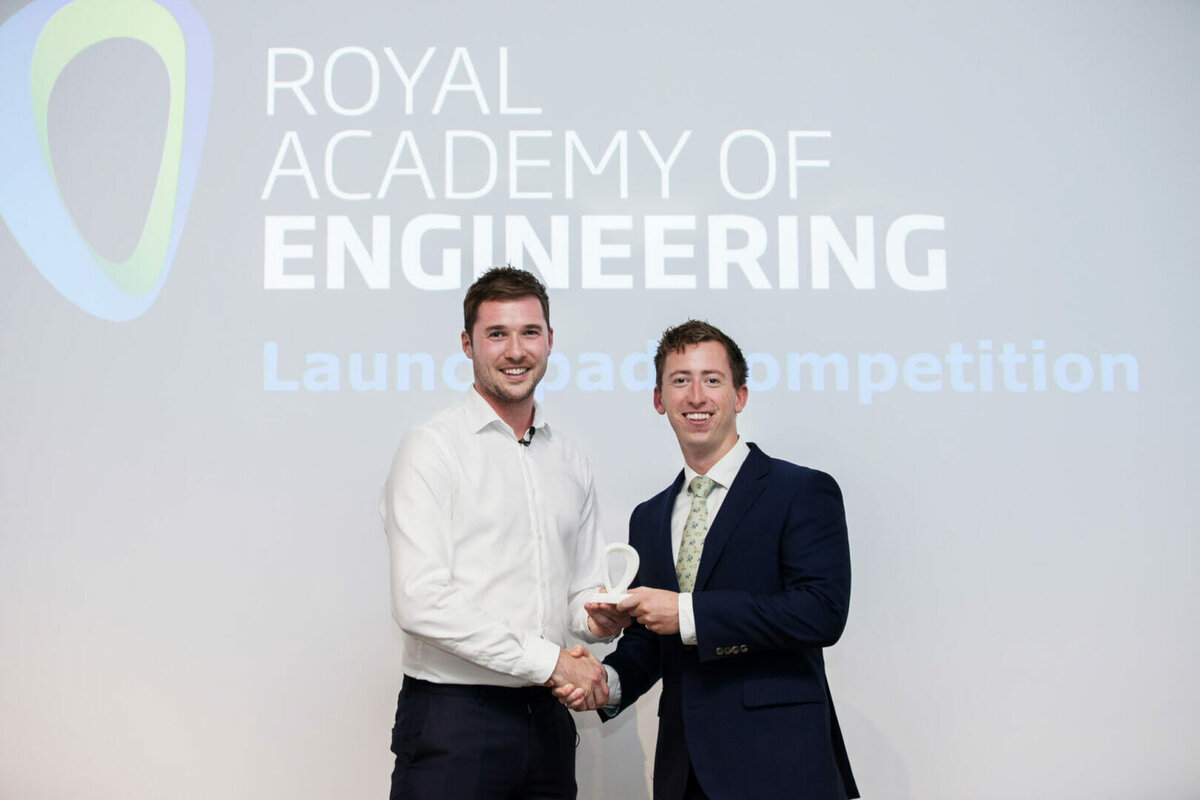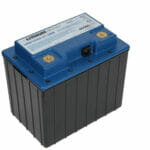25 October 2019
- George Winfield, Founder and CEO of SPYRAS, announced as winner of the prestigious JC Gammon award, receiving a £15,000 prize with support from the Royal Academy of Engineering Enterprise Hub.
- SPYRAS is developing a low-cost, paper-based sensor to help identify sepsis in hospital patients by accurately monitoring their breathing rate.
- Finalist innovations ranged from a wastewater treatment system for developing communities to visual recognition software to help women find a perfectly fitting bra.
Last night [Thursday 24 October] George Winfield, Founder and CEO of SPYRAS, was announced as the UK’s most promising young entrepreneur in technology and engineering by the Royal Academy of Engineering Enterprise Hub.
George, aged 25, was chosen by a panel of experts and business leaders at the forefront of UK engineering, including Elspeth Finch MBE, CEO and Founder of digital platform IAND, and Josh Valman, founder of manufacturing business RPD International.
George’s company SPYRAS is developing a low-cost, paper-based sensor to help identify sepsis in hospital patients by accurately monitoring their breathing rate.
Patient deterioration due to infections that develop into sepsis is the primary cause of Intensive Care Unit admissions from lower dependency hospital wards. A patient’s respiratory rate is well known to be the earliest sign of sepsis.
The prototype paper sensors being developed by SPYRAS will provide continuous monitoring of respiratory rate, inhalation and exhalation periods and depth of breathing. Machine learning will help predict when a patient is beginning to deteriorate and alert clinicians early.
This is important given that every 3.5 seconds someone in the world dies from sepsis and earlier identification of the condition could save up to 14,000 lives a year in the UK alone.
Last night’s event marked the Royal Academy of Engineering Enterprise Hub’s sixth annual Launchpad competition, an initiative set up to encourage more young people to start their own businesses.
A separate Highly Commended Award was presented to Bella Trang, Co-Founder and CEO of Brarista. Brarista is an AI-enabled bra-fitting software replicating the process of professional fitting online. Bella will now receive membership of the Enterprise Hub, giving her access to expert mentoring and training support.
The JC Gammon award includes a £15,000 cash prize, in addition to a year of bespoke training and mentoring to help the winner kick-start their entrepreneurial career. The award is supported by the Gammon family in memory of John Gammon, a civil engineer who benefitted from a scholarship and bursary to fund his initial education.
George Winfield, Founder and CEO of SPYRAS and winner of the Launchpad Competition, said:
“I’m so pleased to be this year’s Launchpad Competition winner; it is one thing having an initial idea about how to solve a specific challenge, and it is another entirely getting industry backing.
“The Royal Academy of Engineering Enterprise Hub will prove invaluable in helping me turn my innovation into a commercially successful, scalable business. It is a great financial boost but the training, mentorship and access to world-class engineers and business experts will also be invaluable. I cannot wait to get going.”
Elspeth Finch MBE is Head Judge for the Launchpad Competition and congratulated George Winfield, commenting:
“This year’s line-up was one of the strongest and most varied that we’ve seen; it was a real pleasure to see such brilliant young minds share their innovative businesses and growth strategies.
“Congratulations to George, I wish him the very best of luck as he expands his business. It’s with the support of the Gammon family that we can provide entrepreneurs like George with the platform to help them accelerate their growth in this critical next stage of their business journey.”
Last year’s Launchpad winner was Rowan Minkley, founder and CEO of Chip[s]Board, an innovative, eco-friendly alternative to MDF.
Since 2013 the Royal Academy of Engineering Enterprise Hub has worked to discover, celebrate and support the country’s next generation of brilliant engineering entrepreneurs.
The three other finalists were:
- Bella Trang Ngo (aged 24): Co-Founder and CEO of Brarista, an AI-enabled bra-fitting software replicating the process of professional fitting online. Brarista enables women to self-measure the correct bra fit in different products – using any digital camera. Eight out of 10 women wear the wrong bra fit, even though ill-fitting bras are associated with musculoskeletal pain, poor posture and reduced self-confidence. Using a proprietary algorithm built on a dataset of thousands of real-life women, Brarista makes bra-shopping a truly personalised experience.
- Matt Escott (aged 23): Co-Founder and CEO of Protolaunch, providing novel rocket engines to reduce the cost and improve the efficiency of launching small satellites into orbit. The UK leads the world in satellite miniaturisation and manufactures 44% of all small satellites, including CubeSats, but to get into space they have to share a ride with larger payloads on a conventional rocket launch. Protolaunch are designing a rocket engine optimised for payloads of less than 50 kg to enable a new generation of small launch vehicles, based on their experience at Cambridge University, building the UK’s largest nitrous oxide-fuelled rocket.
- William Gambier (aged 24): Co-Founder and CTO of WASE. Some 2.3 billion people do not have adequate sanitation and 80% of wastewater globally is discharged into the environment untreated. WASE has developed a wastewater treatment system for developing communities that can operate off the grid, with the potential to provide cheap clean water and biogas for use in cooking or to generate electricity. The electrode-based system removes pathogens while recovering water and producing energy and fertilisers, and works faster than other technologies such as anaerobic digestion.
For more information on the Launchpad programme please visit https://www.raeng.org.uk/grants-and-prizes/support-for-entrepreneurs/launchpad-competition







